Analyzing Sasol's Global Environment: Challenges and Opportunities
VerifiedAdded on 2023/06/05
|12
|4371
|142
Report
AI Summary
This report provides an analysis of Sasol's global business environment, examining key factors such as cost, market dynamics, environmental considerations, and competition that affect global trade and commerce. It includes a PESTEL analysis to evaluate external factors impacting Sasol's operations and discusses the strategic challenges the organization faces when operating globally, including language barriers and cultural differences. The report also explores the influence of globalization on organizational governance, leadership, structure, culture, and functions within Sasol. Furthermore, it applies Hofstede's cultural dimensions and McKinsey's 7s framework to analyze cultural differences and internal operations, respectively. The report concludes by addressing decision-making in a global context for Sasol, methods for entering international markets, and potential barriers to entry, highlighting the overall impact of globalization on the company's functioning. Desklib offers more resources like this to aid students in their studies.
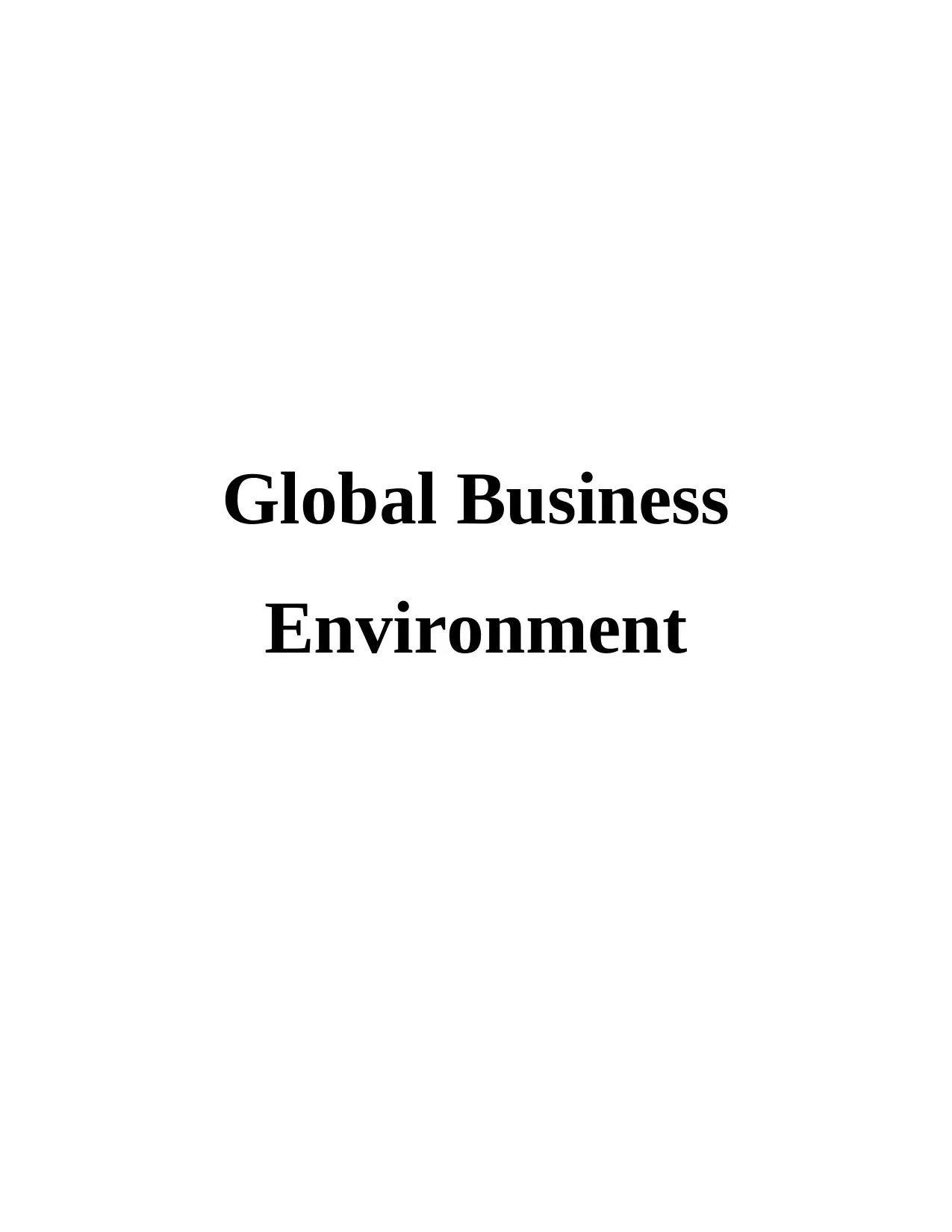
Global Business
Environment
Environment
Paraphrase This Document
Need a fresh take? Get an instant paraphrase of this document with our AI Paraphraser
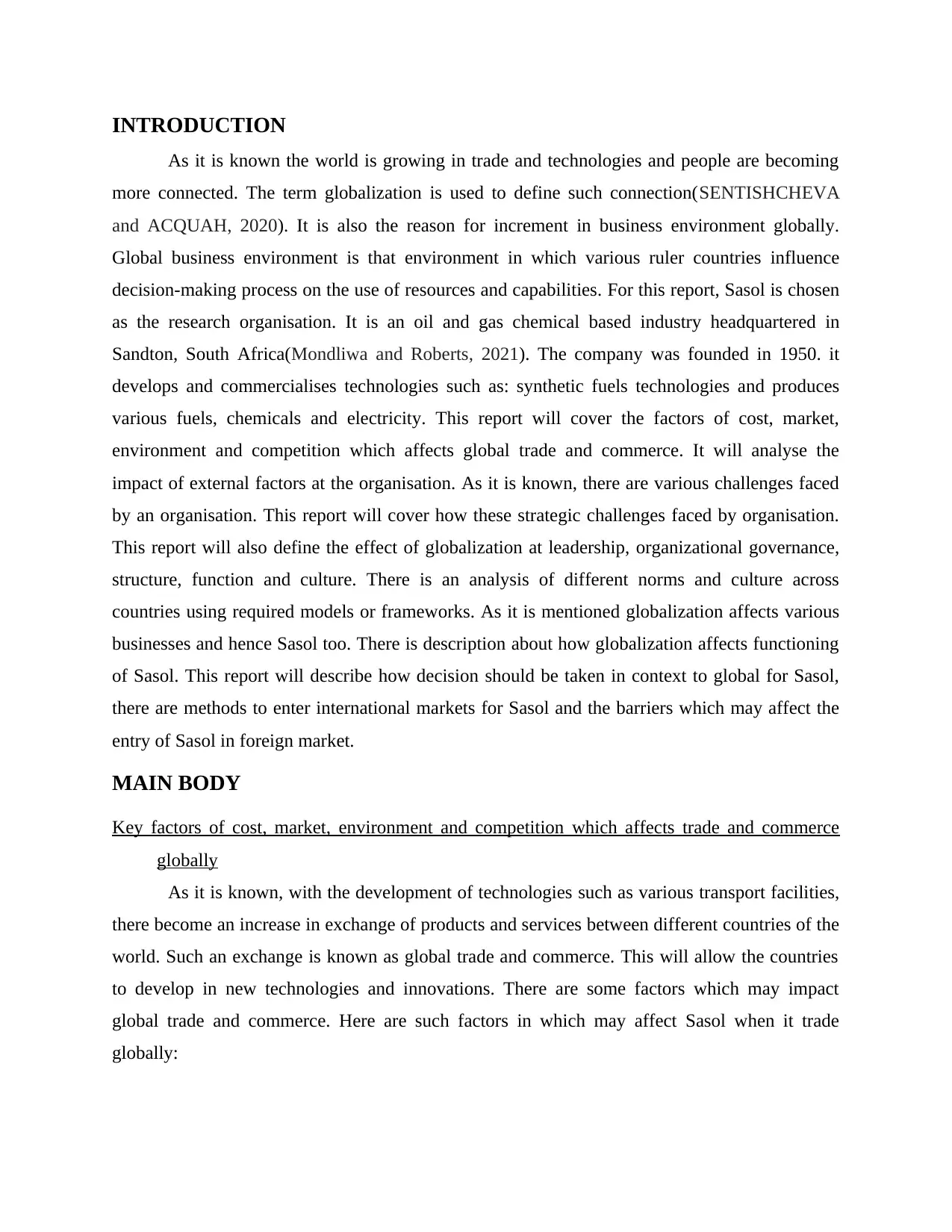
INTRODUCTION
As it is known the world is growing in trade and technologies and people are becoming
more connected. The term globalization is used to define such connection(SENTISHCHEVA
and ACQUAH, 2020). It is also the reason for increment in business environment globally.
Global business environment is that environment in which various ruler countries influence
decision-making process on the use of resources and capabilities. For this report, Sasol is chosen
as the research organisation. It is an oil and gas chemical based industry headquartered in
Sandton, South Africa(Mondliwa and Roberts, 2021). The company was founded in 1950. it
develops and commercialises technologies such as: synthetic fuels technologies and produces
various fuels, chemicals and electricity. This report will cover the factors of cost, market,
environment and competition which affects global trade and commerce. It will analyse the
impact of external factors at the organisation. As it is known, there are various challenges faced
by an organisation. This report will cover how these strategic challenges faced by organisation.
This report will also define the effect of globalization at leadership, organizational governance,
structure, function and culture. There is an analysis of different norms and culture across
countries using required models or frameworks. As it is mentioned globalization affects various
businesses and hence Sasol too. There is description about how globalization affects functioning
of Sasol. This report will describe how decision should be taken in context to global for Sasol,
there are methods to enter international markets for Sasol and the barriers which may affect the
entry of Sasol in foreign market.
MAIN BODY
Key factors of cost, market, environment and competition which affects trade and commerce
globally
As it is known, with the development of technologies such as various transport facilities,
there become an increase in exchange of products and services between different countries of the
world. Such an exchange is known as global trade and commerce. This will allow the countries
to develop in new technologies and innovations. There are some factors which may impact
global trade and commerce. Here are such factors in which may affect Sasol when it trade
globally:
As it is known the world is growing in trade and technologies and people are becoming
more connected. The term globalization is used to define such connection(SENTISHCHEVA
and ACQUAH, 2020). It is also the reason for increment in business environment globally.
Global business environment is that environment in which various ruler countries influence
decision-making process on the use of resources and capabilities. For this report, Sasol is chosen
as the research organisation. It is an oil and gas chemical based industry headquartered in
Sandton, South Africa(Mondliwa and Roberts, 2021). The company was founded in 1950. it
develops and commercialises technologies such as: synthetic fuels technologies and produces
various fuels, chemicals and electricity. This report will cover the factors of cost, market,
environment and competition which affects global trade and commerce. It will analyse the
impact of external factors at the organisation. As it is known, there are various challenges faced
by an organisation. This report will cover how these strategic challenges faced by organisation.
This report will also define the effect of globalization at leadership, organizational governance,
structure, function and culture. There is an analysis of different norms and culture across
countries using required models or frameworks. As it is mentioned globalization affects various
businesses and hence Sasol too. There is description about how globalization affects functioning
of Sasol. This report will describe how decision should be taken in context to global for Sasol,
there are methods to enter international markets for Sasol and the barriers which may affect the
entry of Sasol in foreign market.
MAIN BODY
Key factors of cost, market, environment and competition which affects trade and commerce
globally
As it is known, with the development of technologies such as various transport facilities,
there become an increase in exchange of products and services between different countries of the
world. Such an exchange is known as global trade and commerce. This will allow the countries
to develop in new technologies and innovations. There are some factors which may impact
global trade and commerce. Here are such factors in which may affect Sasol when it trade
globally:
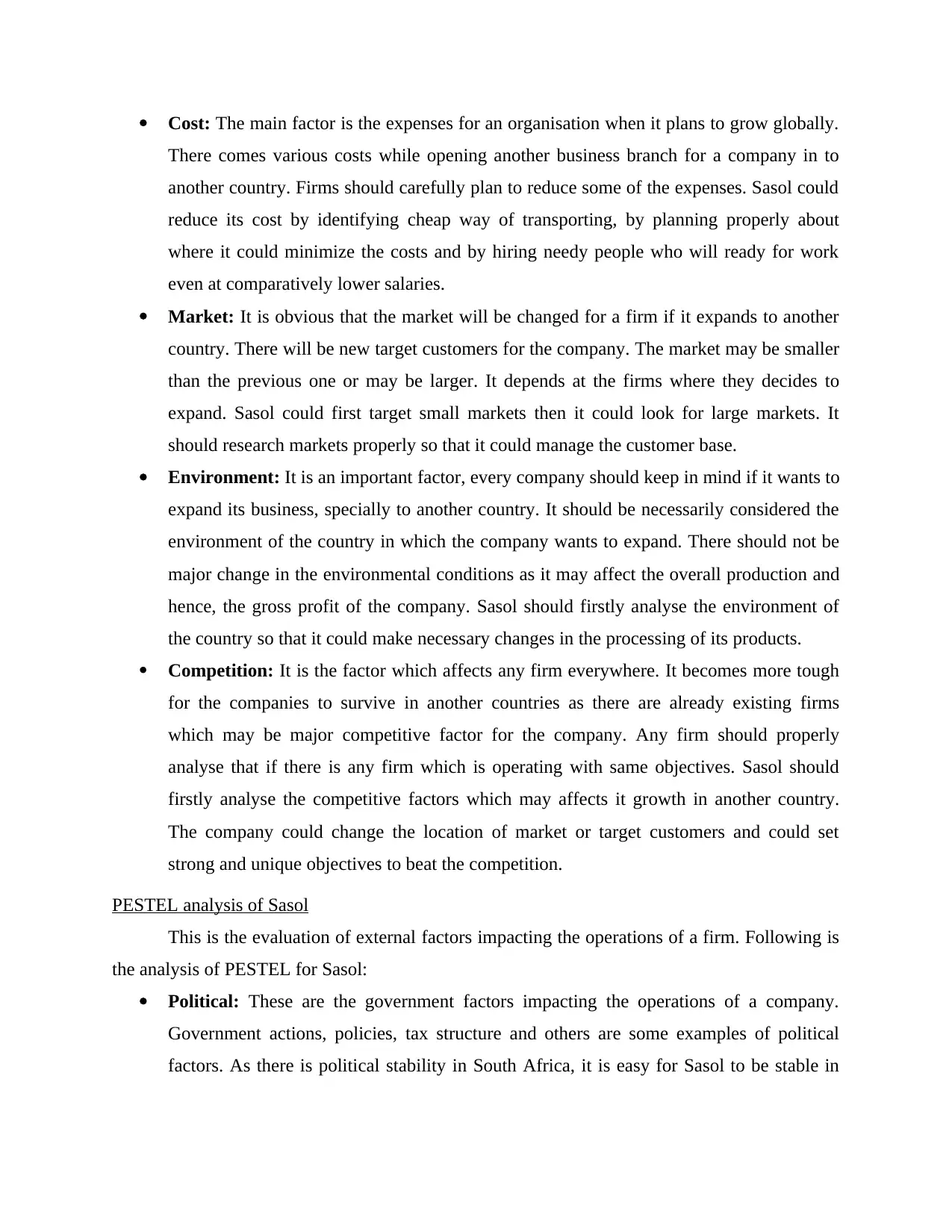
Cost: The main factor is the expenses for an organisation when it plans to grow globally.
There comes various costs while opening another business branch for a company in to
another country. Firms should carefully plan to reduce some of the expenses. Sasol could
reduce its cost by identifying cheap way of transporting, by planning properly about
where it could minimize the costs and by hiring needy people who will ready for work
even at comparatively lower salaries.
Market: It is obvious that the market will be changed for a firm if it expands to another
country. There will be new target customers for the company. The market may be smaller
than the previous one or may be larger. It depends at the firms where they decides to
expand. Sasol could first target small markets then it could look for large markets. It
should research markets properly so that it could manage the customer base.
Environment: It is an important factor, every company should keep in mind if it wants to
expand its business, specially to another country. It should be necessarily considered the
environment of the country in which the company wants to expand. There should not be
major change in the environmental conditions as it may affect the overall production and
hence, the gross profit of the company. Sasol should firstly analyse the environment of
the country so that it could make necessary changes in the processing of its products.
Competition: It is the factor which affects any firm everywhere. It becomes more tough
for the companies to survive in another countries as there are already existing firms
which may be major competitive factor for the company. Any firm should properly
analyse that if there is any firm which is operating with same objectives. Sasol should
firstly analyse the competitive factors which may affects it growth in another country.
The company could change the location of market or target customers and could set
strong and unique objectives to beat the competition.
PESTEL analysis of Sasol
This is the evaluation of external factors impacting the operations of a firm. Following is
the analysis of PESTEL for Sasol:
Political: These are the government factors impacting the operations of a company.
Government actions, policies, tax structure and others are some examples of political
factors. As there is political stability in South Africa, it is easy for Sasol to be stable in
There comes various costs while opening another business branch for a company in to
another country. Firms should carefully plan to reduce some of the expenses. Sasol could
reduce its cost by identifying cheap way of transporting, by planning properly about
where it could minimize the costs and by hiring needy people who will ready for work
even at comparatively lower salaries.
Market: It is obvious that the market will be changed for a firm if it expands to another
country. There will be new target customers for the company. The market may be smaller
than the previous one or may be larger. It depends at the firms where they decides to
expand. Sasol could first target small markets then it could look for large markets. It
should research markets properly so that it could manage the customer base.
Environment: It is an important factor, every company should keep in mind if it wants to
expand its business, specially to another country. It should be necessarily considered the
environment of the country in which the company wants to expand. There should not be
major change in the environmental conditions as it may affect the overall production and
hence, the gross profit of the company. Sasol should firstly analyse the environment of
the country so that it could make necessary changes in the processing of its products.
Competition: It is the factor which affects any firm everywhere. It becomes more tough
for the companies to survive in another countries as there are already existing firms
which may be major competitive factor for the company. Any firm should properly
analyse that if there is any firm which is operating with same objectives. Sasol should
firstly analyse the competitive factors which may affects it growth in another country.
The company could change the location of market or target customers and could set
strong and unique objectives to beat the competition.
PESTEL analysis of Sasol
This is the evaluation of external factors impacting the operations of a firm. Following is
the analysis of PESTEL for Sasol:
Political: These are the government factors impacting the operations of a company.
Government actions, policies, tax structure and others are some examples of political
factors. As there is political stability in South Africa, it is easy for Sasol to be stable in
⊘ This is a preview!⊘
Do you want full access?
Subscribe today to unlock all pages.

Trusted by 1+ million students worldwide
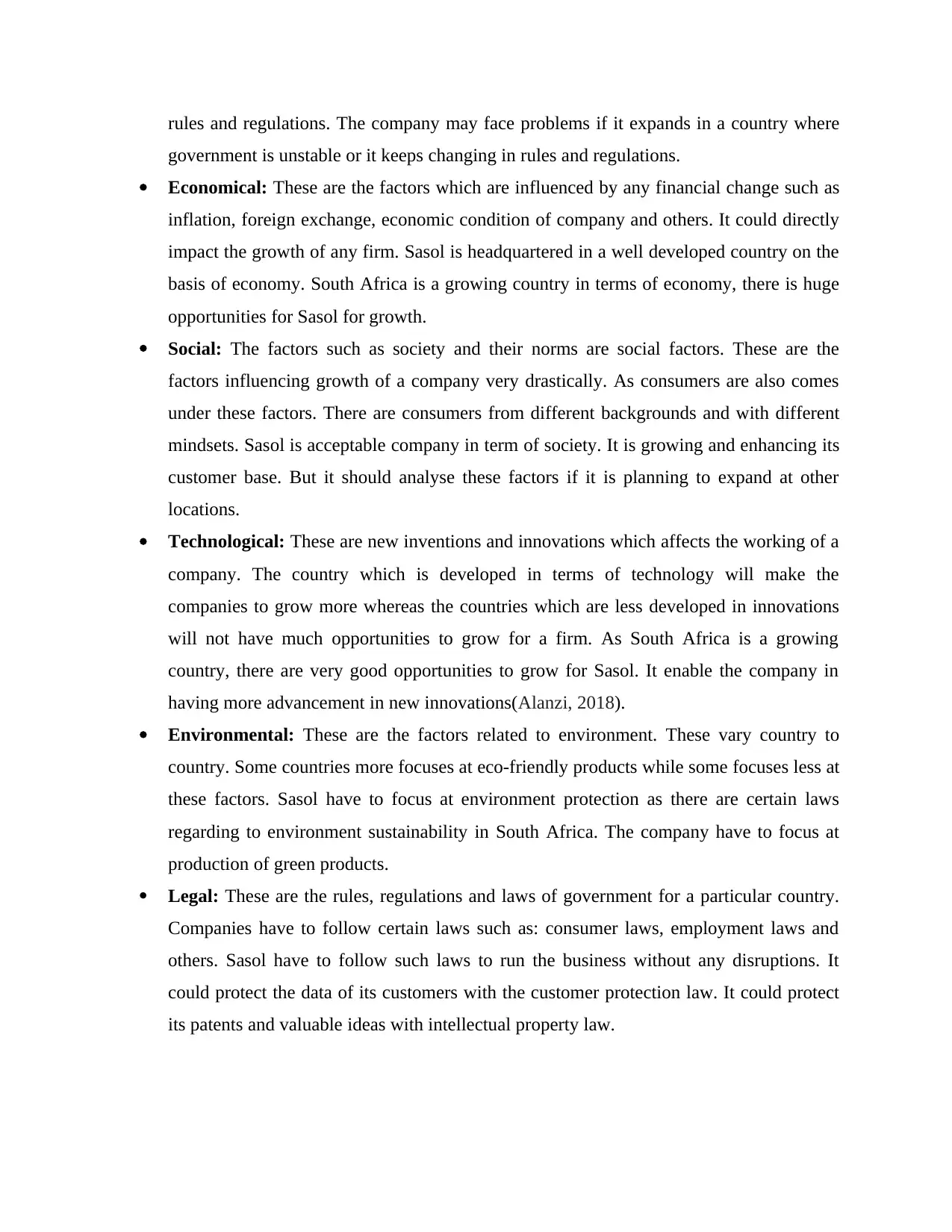
rules and regulations. The company may face problems if it expands in a country where
government is unstable or it keeps changing in rules and regulations.
Economical: These are the factors which are influenced by any financial change such as
inflation, foreign exchange, economic condition of company and others. It could directly
impact the growth of any firm. Sasol is headquartered in a well developed country on the
basis of economy. South Africa is a growing country in terms of economy, there is huge
opportunities for Sasol for growth.
Social: The factors such as society and their norms are social factors. These are the
factors influencing growth of a company very drastically. As consumers are also comes
under these factors. There are consumers from different backgrounds and with different
mindsets. Sasol is acceptable company in term of society. It is growing and enhancing its
customer base. But it should analyse these factors if it is planning to expand at other
locations.
Technological: These are new inventions and innovations which affects the working of a
company. The country which is developed in terms of technology will make the
companies to grow more whereas the countries which are less developed in innovations
will not have much opportunities to grow for a firm. As South Africa is a growing
country, there are very good opportunities to grow for Sasol. It enable the company in
having more advancement in new innovations(Alanzi, 2018).
Environmental: These are the factors related to environment. These vary country to
country. Some countries more focuses at eco-friendly products while some focuses less at
these factors. Sasol have to focus at environment protection as there are certain laws
regarding to environment sustainability in South Africa. The company have to focus at
production of green products.
Legal: These are the rules, regulations and laws of government for a particular country.
Companies have to follow certain laws such as: consumer laws, employment laws and
others. Sasol have to follow such laws to run the business without any disruptions. It
could protect the data of its customers with the customer protection law. It could protect
its patents and valuable ideas with intellectual property law.
government is unstable or it keeps changing in rules and regulations.
Economical: These are the factors which are influenced by any financial change such as
inflation, foreign exchange, economic condition of company and others. It could directly
impact the growth of any firm. Sasol is headquartered in a well developed country on the
basis of economy. South Africa is a growing country in terms of economy, there is huge
opportunities for Sasol for growth.
Social: The factors such as society and their norms are social factors. These are the
factors influencing growth of a company very drastically. As consumers are also comes
under these factors. There are consumers from different backgrounds and with different
mindsets. Sasol is acceptable company in term of society. It is growing and enhancing its
customer base. But it should analyse these factors if it is planning to expand at other
locations.
Technological: These are new inventions and innovations which affects the working of a
company. The country which is developed in terms of technology will make the
companies to grow more whereas the countries which are less developed in innovations
will not have much opportunities to grow for a firm. As South Africa is a growing
country, there are very good opportunities to grow for Sasol. It enable the company in
having more advancement in new innovations(Alanzi, 2018).
Environmental: These are the factors related to environment. These vary country to
country. Some countries more focuses at eco-friendly products while some focuses less at
these factors. Sasol have to focus at environment protection as there are certain laws
regarding to environment sustainability in South Africa. The company have to focus at
production of green products.
Legal: These are the rules, regulations and laws of government for a particular country.
Companies have to follow certain laws such as: consumer laws, employment laws and
others. Sasol have to follow such laws to run the business without any disruptions. It
could protect the data of its customers with the customer protection law. It could protect
its patents and valuable ideas with intellectual property law.
Paraphrase This Document
Need a fresh take? Get an instant paraphrase of this document with our AI Paraphraser
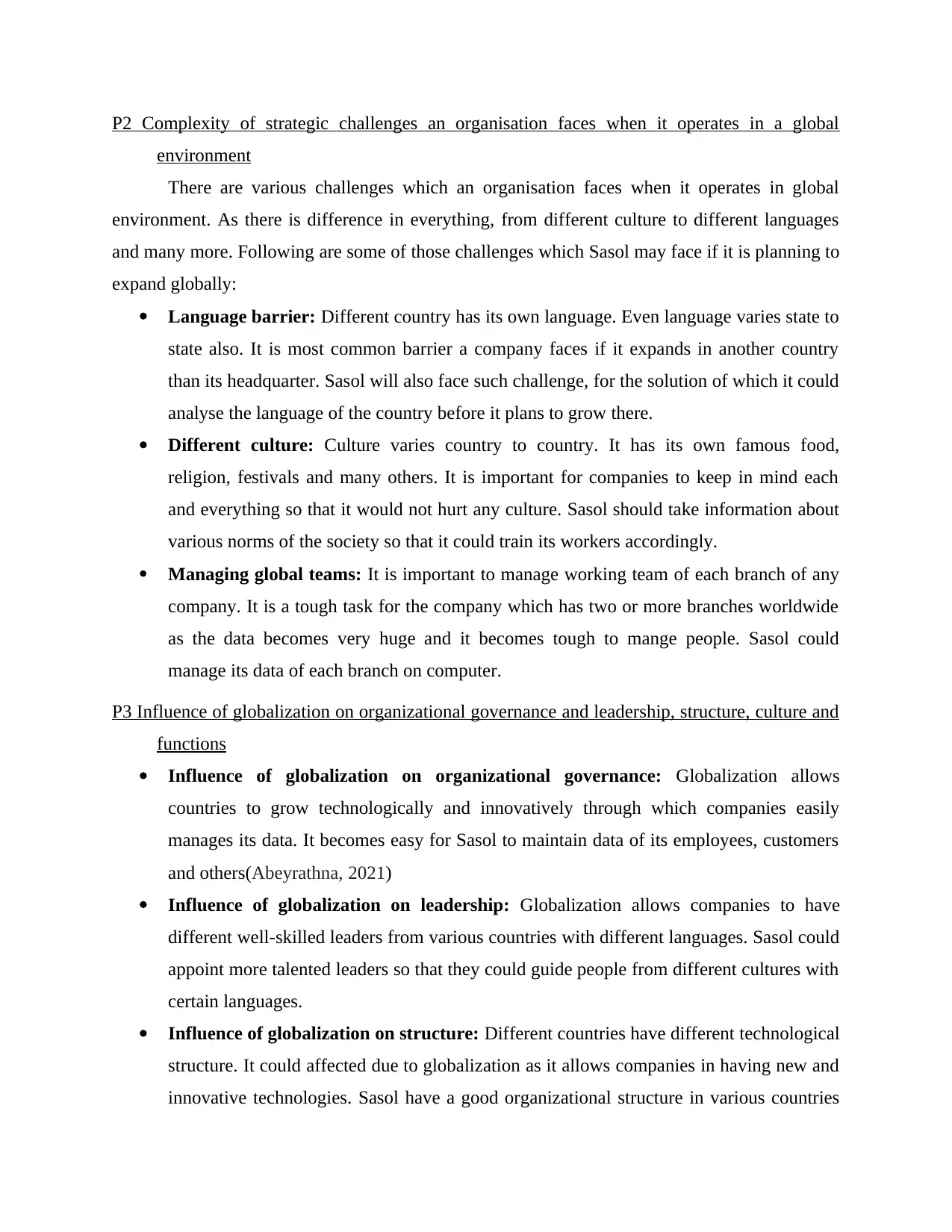
P2 Complexity of strategic challenges an organisation faces when it operates in a global
environment
There are various challenges which an organisation faces when it operates in global
environment. As there is difference in everything, from different culture to different languages
and many more. Following are some of those challenges which Sasol may face if it is planning to
expand globally:
Language barrier: Different country has its own language. Even language varies state to
state also. It is most common barrier a company faces if it expands in another country
than its headquarter. Sasol will also face such challenge, for the solution of which it could
analyse the language of the country before it plans to grow there.
Different culture: Culture varies country to country. It has its own famous food,
religion, festivals and many others. It is important for companies to keep in mind each
and everything so that it would not hurt any culture. Sasol should take information about
various norms of the society so that it could train its workers accordingly.
Managing global teams: It is important to manage working team of each branch of any
company. It is a tough task for the company which has two or more branches worldwide
as the data becomes very huge and it becomes tough to mange people. Sasol could
manage its data of each branch on computer.
P3 Influence of globalization on organizational governance and leadership, structure, culture and
functions
Influence of globalization on organizational governance: Globalization allows
countries to grow technologically and innovatively through which companies easily
manages its data. It becomes easy for Sasol to maintain data of its employees, customers
and others(Abeyrathna, 2021)
Influence of globalization on leadership: Globalization allows companies to have
different well-skilled leaders from various countries with different languages. Sasol could
appoint more talented leaders so that they could guide people from different cultures with
certain languages.
Influence of globalization on structure: Different countries have different technological
structure. It could affected due to globalization as it allows companies in having new and
innovative technologies. Sasol have a good organizational structure in various countries
environment
There are various challenges which an organisation faces when it operates in global
environment. As there is difference in everything, from different culture to different languages
and many more. Following are some of those challenges which Sasol may face if it is planning to
expand globally:
Language barrier: Different country has its own language. Even language varies state to
state also. It is most common barrier a company faces if it expands in another country
than its headquarter. Sasol will also face such challenge, for the solution of which it could
analyse the language of the country before it plans to grow there.
Different culture: Culture varies country to country. It has its own famous food,
religion, festivals and many others. It is important for companies to keep in mind each
and everything so that it would not hurt any culture. Sasol should take information about
various norms of the society so that it could train its workers accordingly.
Managing global teams: It is important to manage working team of each branch of any
company. It is a tough task for the company which has two or more branches worldwide
as the data becomes very huge and it becomes tough to mange people. Sasol could
manage its data of each branch on computer.
P3 Influence of globalization on organizational governance and leadership, structure, culture and
functions
Influence of globalization on organizational governance: Globalization allows
countries to grow technologically and innovatively through which companies easily
manages its data. It becomes easy for Sasol to maintain data of its employees, customers
and others(Abeyrathna, 2021)
Influence of globalization on leadership: Globalization allows companies to have
different well-skilled leaders from various countries with different languages. Sasol could
appoint more talented leaders so that they could guide people from different cultures with
certain languages.
Influence of globalization on structure: Different countries have different technological
structure. It could affected due to globalization as it allows companies in having new and
innovative technologies. Sasol have a good organizational structure in various countries
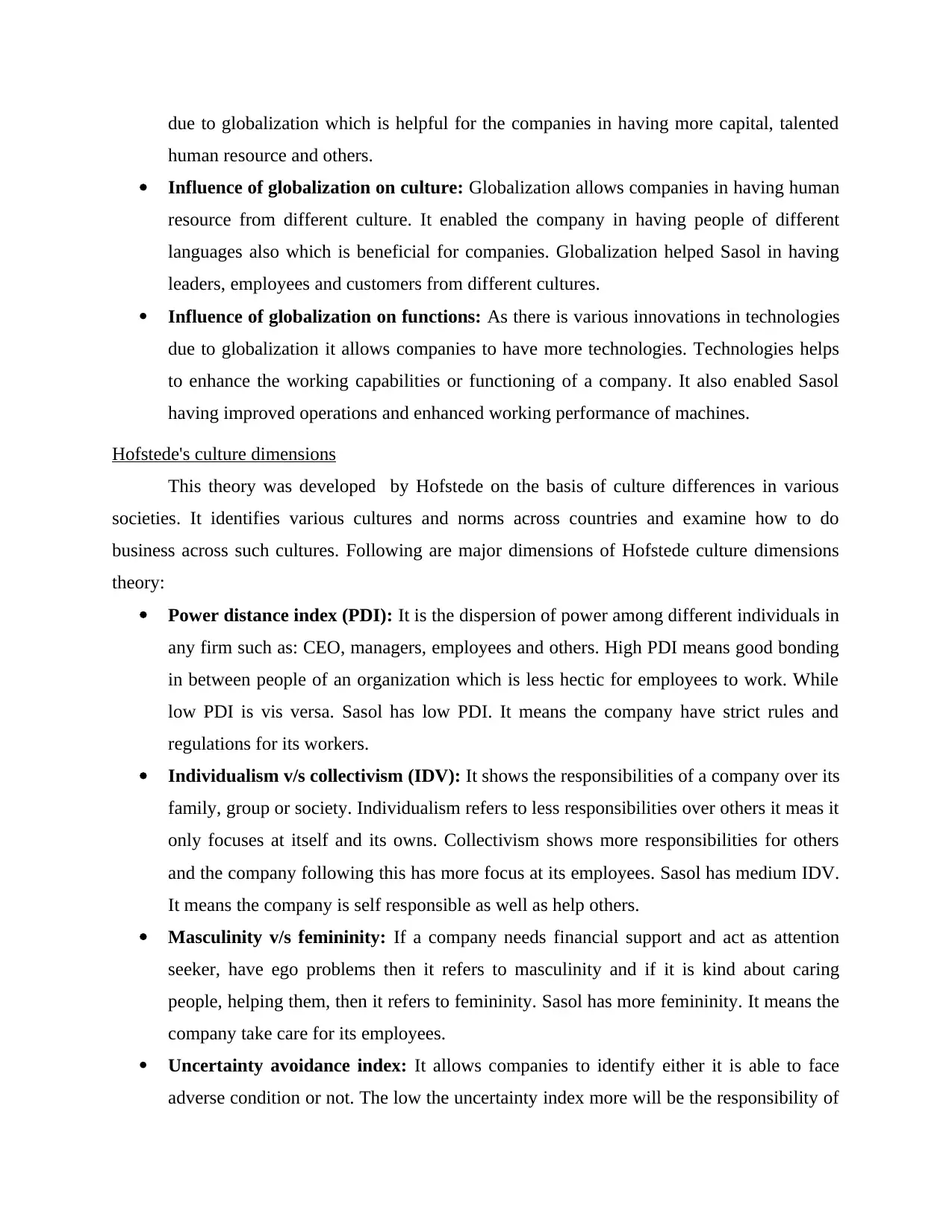
due to globalization which is helpful for the companies in having more capital, talented
human resource and others.
Influence of globalization on culture: Globalization allows companies in having human
resource from different culture. It enabled the company in having people of different
languages also which is beneficial for companies. Globalization helped Sasol in having
leaders, employees and customers from different cultures.
Influence of globalization on functions: As there is various innovations in technologies
due to globalization it allows companies to have more technologies. Technologies helps
to enhance the working capabilities or functioning of a company. It also enabled Sasol
having improved operations and enhanced working performance of machines.
Hofstede's culture dimensions
This theory was developed by Hofstede on the basis of culture differences in various
societies. It identifies various cultures and norms across countries and examine how to do
business across such cultures. Following are major dimensions of Hofstede culture dimensions
theory:
Power distance index (PDI): It is the dispersion of power among different individuals in
any firm such as: CEO, managers, employees and others. High PDI means good bonding
in between people of an organization which is less hectic for employees to work. While
low PDI is vis versa. Sasol has low PDI. It means the company have strict rules and
regulations for its workers.
Individualism v/s collectivism (IDV): It shows the responsibilities of a company over its
family, group or society. Individualism refers to less responsibilities over others it meas it
only focuses at itself and its owns. Collectivism shows more responsibilities for others
and the company following this has more focus at its employees. Sasol has medium IDV.
It means the company is self responsible as well as help others.
Masculinity v/s femininity: If a company needs financial support and act as attention
seeker, have ego problems then it refers to masculinity and if it is kind about caring
people, helping them, then it refers to femininity. Sasol has more femininity. It means the
company take care for its employees.
Uncertainty avoidance index: It allows companies to identify either it is able to face
adverse condition or not. The low the uncertainty index more will be the responsibility of
human resource and others.
Influence of globalization on culture: Globalization allows companies in having human
resource from different culture. It enabled the company in having people of different
languages also which is beneficial for companies. Globalization helped Sasol in having
leaders, employees and customers from different cultures.
Influence of globalization on functions: As there is various innovations in technologies
due to globalization it allows companies to have more technologies. Technologies helps
to enhance the working capabilities or functioning of a company. It also enabled Sasol
having improved operations and enhanced working performance of machines.
Hofstede's culture dimensions
This theory was developed by Hofstede on the basis of culture differences in various
societies. It identifies various cultures and norms across countries and examine how to do
business across such cultures. Following are major dimensions of Hofstede culture dimensions
theory:
Power distance index (PDI): It is the dispersion of power among different individuals in
any firm such as: CEO, managers, employees and others. High PDI means good bonding
in between people of an organization which is less hectic for employees to work. While
low PDI is vis versa. Sasol has low PDI. It means the company have strict rules and
regulations for its workers.
Individualism v/s collectivism (IDV): It shows the responsibilities of a company over its
family, group or society. Individualism refers to less responsibilities over others it meas it
only focuses at itself and its owns. Collectivism shows more responsibilities for others
and the company following this has more focus at its employees. Sasol has medium IDV.
It means the company is self responsible as well as help others.
Masculinity v/s femininity: If a company needs financial support and act as attention
seeker, have ego problems then it refers to masculinity and if it is kind about caring
people, helping them, then it refers to femininity. Sasol has more femininity. It means the
company take care for its employees.
Uncertainty avoidance index: It allows companies to identify either it is able to face
adverse condition or not. The low the uncertainty index more will be the responsibility of
⊘ This is a preview!⊘
Do you want full access?
Subscribe today to unlock all pages.

Trusted by 1+ million students worldwide
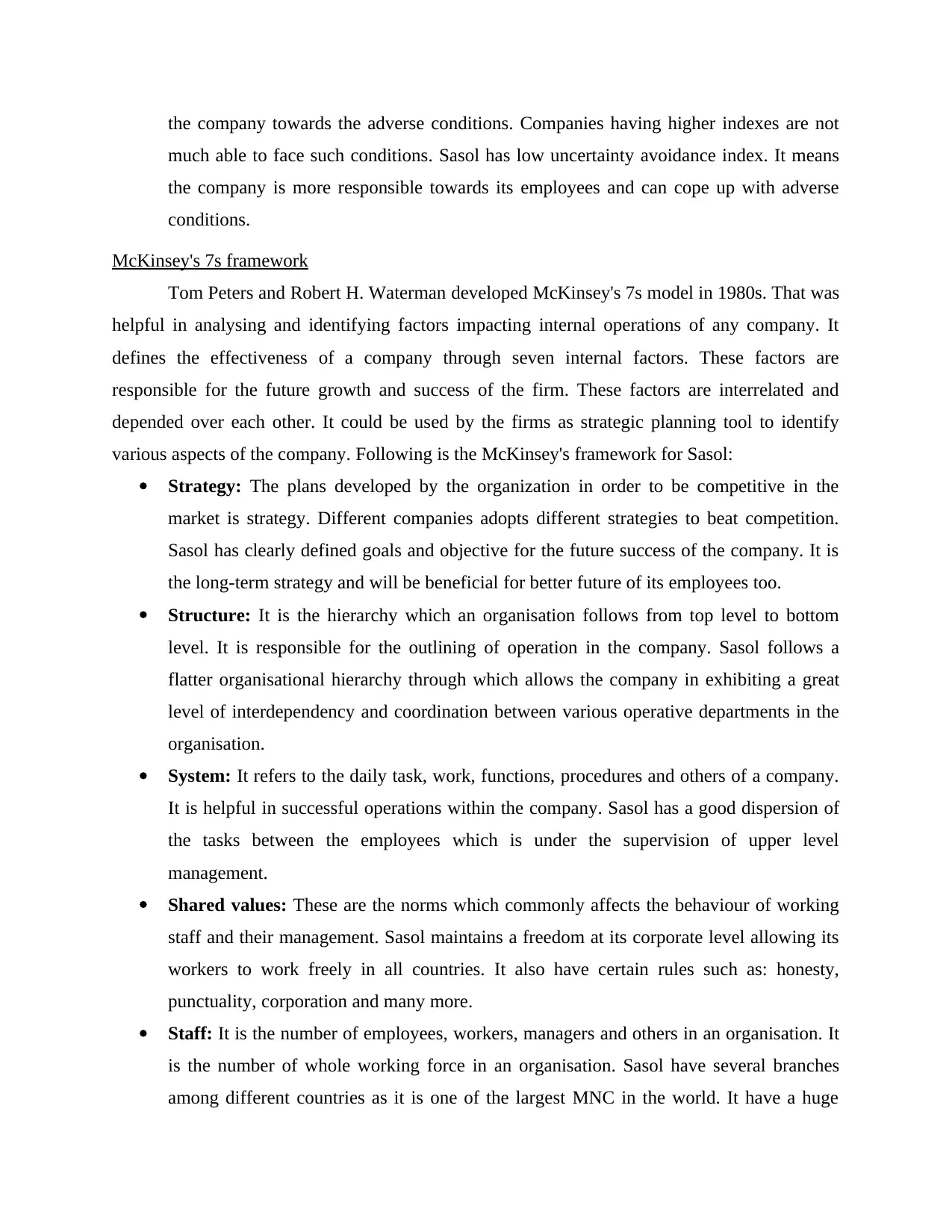
the company towards the adverse conditions. Companies having higher indexes are not
much able to face such conditions. Sasol has low uncertainty avoidance index. It means
the company is more responsible towards its employees and can cope up with adverse
conditions.
McKinsey's 7s framework
Tom Peters and Robert H. Waterman developed McKinsey's 7s model in 1980s. That was
helpful in analysing and identifying factors impacting internal operations of any company. It
defines the effectiveness of a company through seven internal factors. These factors are
responsible for the future growth and success of the firm. These factors are interrelated and
depended over each other. It could be used by the firms as strategic planning tool to identify
various aspects of the company. Following is the McKinsey's framework for Sasol:
Strategy: The plans developed by the organization in order to be competitive in the
market is strategy. Different companies adopts different strategies to beat competition.
Sasol has clearly defined goals and objective for the future success of the company. It is
the long-term strategy and will be beneficial for better future of its employees too.
Structure: It is the hierarchy which an organisation follows from top level to bottom
level. It is responsible for the outlining of operation in the company. Sasol follows a
flatter organisational hierarchy through which allows the company in exhibiting a great
level of interdependency and coordination between various operative departments in the
organisation.
System: It refers to the daily task, work, functions, procedures and others of a company.
It is helpful in successful operations within the company. Sasol has a good dispersion of
the tasks between the employees which is under the supervision of upper level
management.
Shared values: These are the norms which commonly affects the behaviour of working
staff and their management. Sasol maintains a freedom at its corporate level allowing its
workers to work freely in all countries. It also have certain rules such as: honesty,
punctuality, corporation and many more.
Staff: It is the number of employees, workers, managers and others in an organisation. It
is the number of whole working force in an organisation. Sasol have several branches
among different countries as it is one of the largest MNC in the world. It have a huge
much able to face such conditions. Sasol has low uncertainty avoidance index. It means
the company is more responsible towards its employees and can cope up with adverse
conditions.
McKinsey's 7s framework
Tom Peters and Robert H. Waterman developed McKinsey's 7s model in 1980s. That was
helpful in analysing and identifying factors impacting internal operations of any company. It
defines the effectiveness of a company through seven internal factors. These factors are
responsible for the future growth and success of the firm. These factors are interrelated and
depended over each other. It could be used by the firms as strategic planning tool to identify
various aspects of the company. Following is the McKinsey's framework for Sasol:
Strategy: The plans developed by the organization in order to be competitive in the
market is strategy. Different companies adopts different strategies to beat competition.
Sasol has clearly defined goals and objective for the future success of the company. It is
the long-term strategy and will be beneficial for better future of its employees too.
Structure: It is the hierarchy which an organisation follows from top level to bottom
level. It is responsible for the outlining of operation in the company. Sasol follows a
flatter organisational hierarchy through which allows the company in exhibiting a great
level of interdependency and coordination between various operative departments in the
organisation.
System: It refers to the daily task, work, functions, procedures and others of a company.
It is helpful in successful operations within the company. Sasol has a good dispersion of
the tasks between the employees which is under the supervision of upper level
management.
Shared values: These are the norms which commonly affects the behaviour of working
staff and their management. Sasol maintains a freedom at its corporate level allowing its
workers to work freely in all countries. It also have certain rules such as: honesty,
punctuality, corporation and many more.
Staff: It is the number of employees, workers, managers and others in an organisation. It
is the number of whole working force in an organisation. Sasol have several branches
among different countries as it is one of the largest MNC in the world. It have a huge
Paraphrase This Document
Need a fresh take? Get an instant paraphrase of this document with our AI Paraphraser
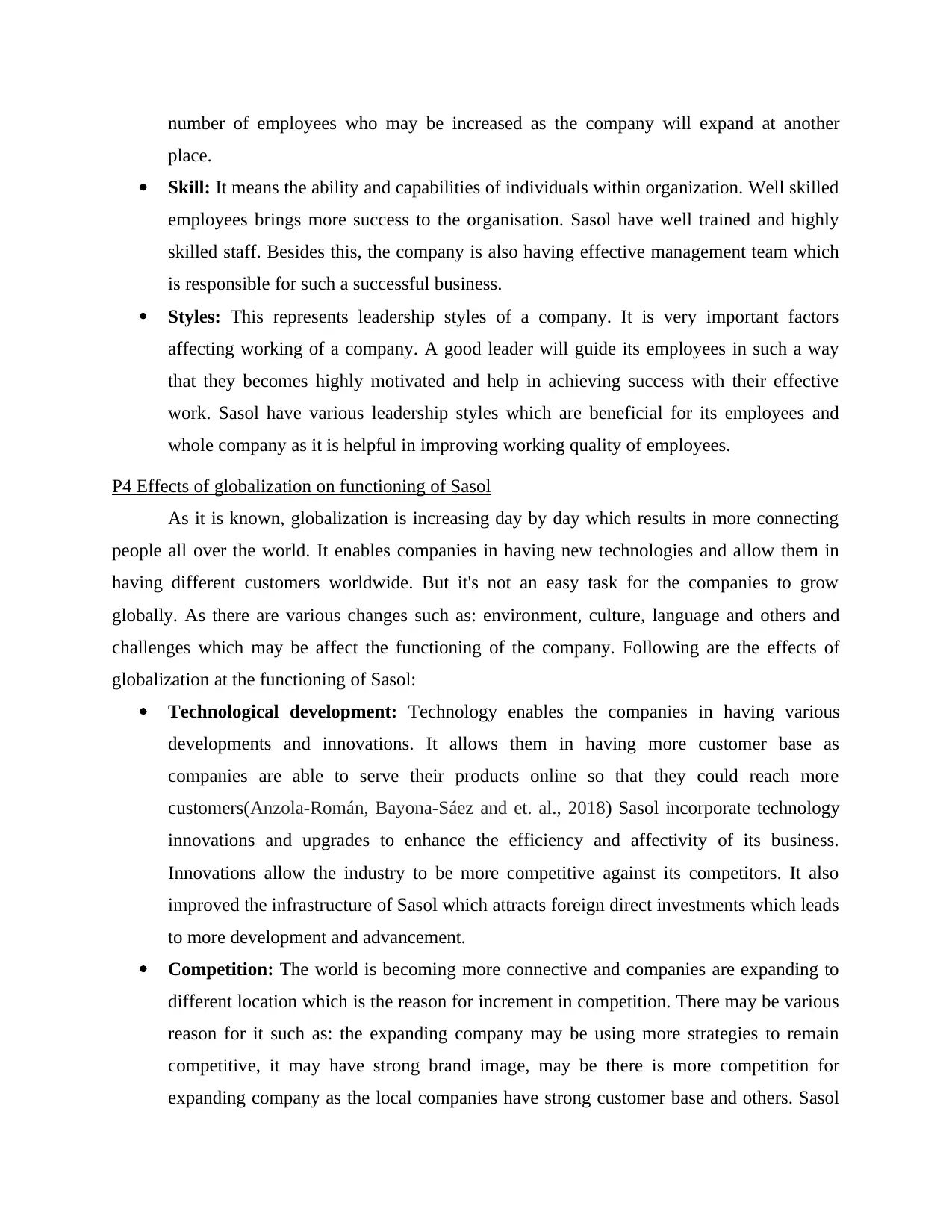
number of employees who may be increased as the company will expand at another
place.
Skill: It means the ability and capabilities of individuals within organization. Well skilled
employees brings more success to the organisation. Sasol have well trained and highly
skilled staff. Besides this, the company is also having effective management team which
is responsible for such a successful business.
Styles: This represents leadership styles of a company. It is very important factors
affecting working of a company. A good leader will guide its employees in such a way
that they becomes highly motivated and help in achieving success with their effective
work. Sasol have various leadership styles which are beneficial for its employees and
whole company as it is helpful in improving working quality of employees.
P4 Effects of globalization on functioning of Sasol
As it is known, globalization is increasing day by day which results in more connecting
people all over the world. It enables companies in having new technologies and allow them in
having different customers worldwide. But it's not an easy task for the companies to grow
globally. As there are various changes such as: environment, culture, language and others and
challenges which may be affect the functioning of the company. Following are the effects of
globalization at the functioning of Sasol:
Technological development: Technology enables the companies in having various
developments and innovations. It allows them in having more customer base as
companies are able to serve their products online so that they could reach more
customers(Anzola-Román, Bayona-Sáez and et. al., 2018) Sasol incorporate technology
innovations and upgrades to enhance the efficiency and affectivity of its business.
Innovations allow the industry to be more competitive against its competitors. It also
improved the infrastructure of Sasol which attracts foreign direct investments which leads
to more development and advancement.
Competition: The world is becoming more connective and companies are expanding to
different location which is the reason for increment in competition. There may be various
reason for it such as: the expanding company may be using more strategies to remain
competitive, it may have strong brand image, may be there is more competition for
expanding company as the local companies have strong customer base and others. Sasol
place.
Skill: It means the ability and capabilities of individuals within organization. Well skilled
employees brings more success to the organisation. Sasol have well trained and highly
skilled staff. Besides this, the company is also having effective management team which
is responsible for such a successful business.
Styles: This represents leadership styles of a company. It is very important factors
affecting working of a company. A good leader will guide its employees in such a way
that they becomes highly motivated and help in achieving success with their effective
work. Sasol have various leadership styles which are beneficial for its employees and
whole company as it is helpful in improving working quality of employees.
P4 Effects of globalization on functioning of Sasol
As it is known, globalization is increasing day by day which results in more connecting
people all over the world. It enables companies in having new technologies and allow them in
having different customers worldwide. But it's not an easy task for the companies to grow
globally. As there are various changes such as: environment, culture, language and others and
challenges which may be affect the functioning of the company. Following are the effects of
globalization at the functioning of Sasol:
Technological development: Technology enables the companies in having various
developments and innovations. It allows them in having more customer base as
companies are able to serve their products online so that they could reach more
customers(Anzola-Román, Bayona-Sáez and et. al., 2018) Sasol incorporate technology
innovations and upgrades to enhance the efficiency and affectivity of its business.
Innovations allow the industry to be more competitive against its competitors. It also
improved the infrastructure of Sasol which attracts foreign direct investments which leads
to more development and advancement.
Competition: The world is becoming more connective and companies are expanding to
different location which is the reason for increment in competition. There may be various
reason for it such as: the expanding company may be using more strategies to remain
competitive, it may have strong brand image, may be there is more competition for
expanding company as the local companies have strong customer base and others. Sasol
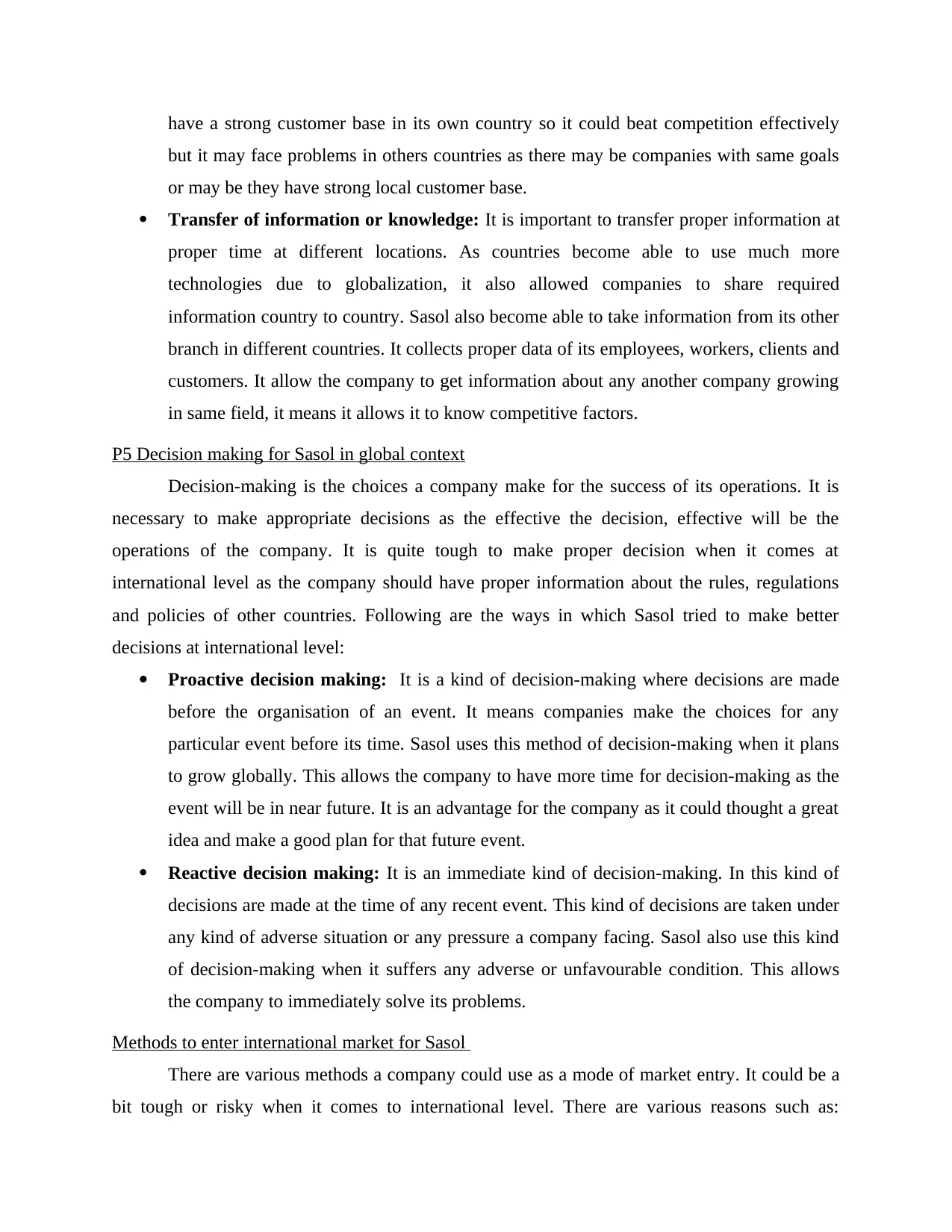
have a strong customer base in its own country so it could beat competition effectively
but it may face problems in others countries as there may be companies with same goals
or may be they have strong local customer base.
Transfer of information or knowledge: It is important to transfer proper information at
proper time at different locations. As countries become able to use much more
technologies due to globalization, it also allowed companies to share required
information country to country. Sasol also become able to take information from its other
branch in different countries. It collects proper data of its employees, workers, clients and
customers. It allow the company to get information about any another company growing
in same field, it means it allows it to know competitive factors.
P5 Decision making for Sasol in global context
Decision-making is the choices a company make for the success of its operations. It is
necessary to make appropriate decisions as the effective the decision, effective will be the
operations of the company. It is quite tough to make proper decision when it comes at
international level as the company should have proper information about the rules, regulations
and policies of other countries. Following are the ways in which Sasol tried to make better
decisions at international level:
Proactive decision making: It is a kind of decision-making where decisions are made
before the organisation of an event. It means companies make the choices for any
particular event before its time. Sasol uses this method of decision-making when it plans
to grow globally. This allows the company to have more time for decision-making as the
event will be in near future. It is an advantage for the company as it could thought a great
idea and make a good plan for that future event.
Reactive decision making: It is an immediate kind of decision-making. In this kind of
decisions are made at the time of any recent event. This kind of decisions are taken under
any kind of adverse situation or any pressure a company facing. Sasol also use this kind
of decision-making when it suffers any adverse or unfavourable condition. This allows
the company to immediately solve its problems.
Methods to enter international market for Sasol
There are various methods a company could use as a mode of market entry. It could be a
bit tough or risky when it comes to international level. There are various reasons such as:
but it may face problems in others countries as there may be companies with same goals
or may be they have strong local customer base.
Transfer of information or knowledge: It is important to transfer proper information at
proper time at different locations. As countries become able to use much more
technologies due to globalization, it also allowed companies to share required
information country to country. Sasol also become able to take information from its other
branch in different countries. It collects proper data of its employees, workers, clients and
customers. It allow the company to get information about any another company growing
in same field, it means it allows it to know competitive factors.
P5 Decision making for Sasol in global context
Decision-making is the choices a company make for the success of its operations. It is
necessary to make appropriate decisions as the effective the decision, effective will be the
operations of the company. It is quite tough to make proper decision when it comes at
international level as the company should have proper information about the rules, regulations
and policies of other countries. Following are the ways in which Sasol tried to make better
decisions at international level:
Proactive decision making: It is a kind of decision-making where decisions are made
before the organisation of an event. It means companies make the choices for any
particular event before its time. Sasol uses this method of decision-making when it plans
to grow globally. This allows the company to have more time for decision-making as the
event will be in near future. It is an advantage for the company as it could thought a great
idea and make a good plan for that future event.
Reactive decision making: It is an immediate kind of decision-making. In this kind of
decisions are made at the time of any recent event. This kind of decisions are taken under
any kind of adverse situation or any pressure a company facing. Sasol also use this kind
of decision-making when it suffers any adverse or unfavourable condition. This allows
the company to immediately solve its problems.
Methods to enter international market for Sasol
There are various methods a company could use as a mode of market entry. It could be a
bit tough or risky when it comes to international level. There are various reasons such as:
⊘ This is a preview!⊘
Do you want full access?
Subscribe today to unlock all pages.

Trusted by 1+ million students worldwide
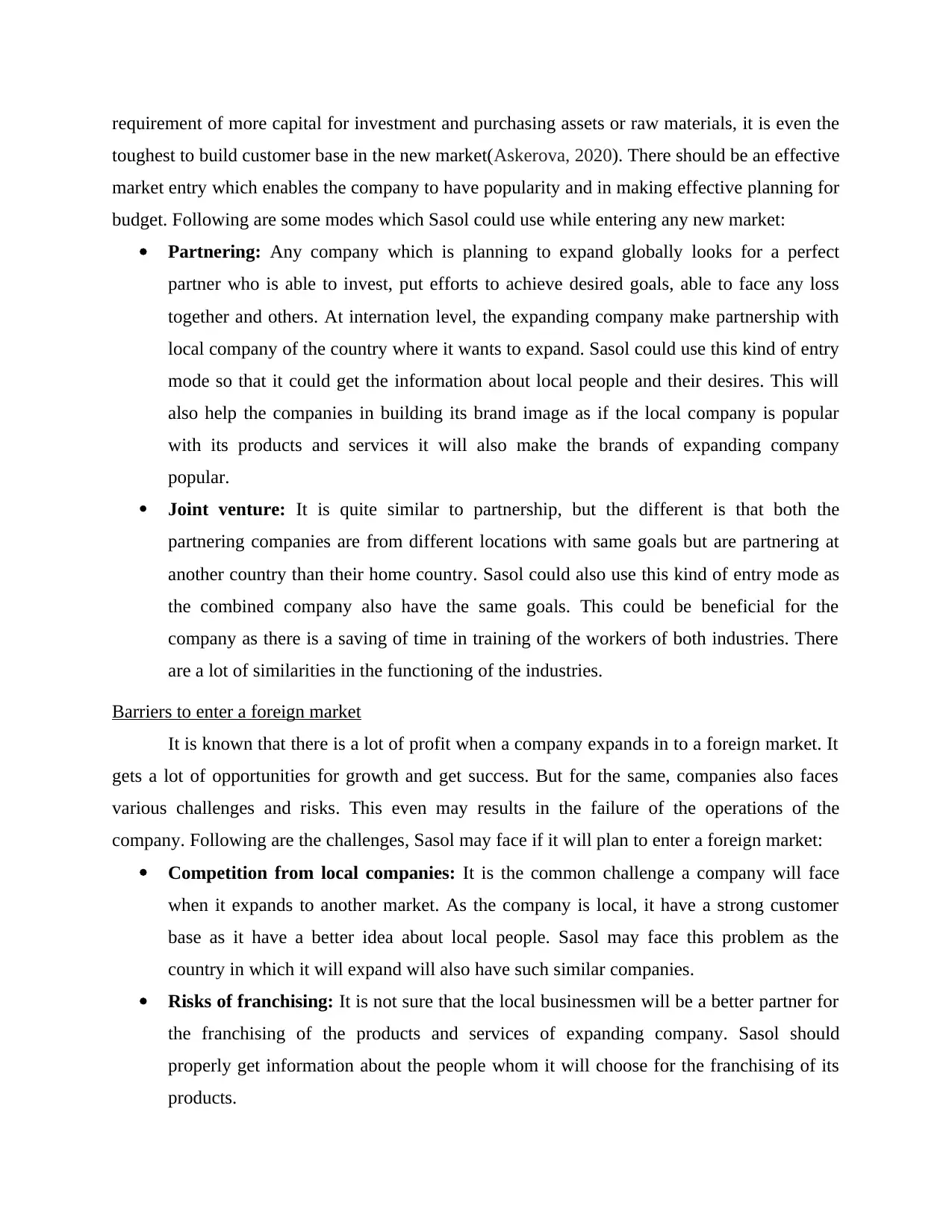
requirement of more capital for investment and purchasing assets or raw materials, it is even the
toughest to build customer base in the new market(Askerova, 2020). There should be an effective
market entry which enables the company to have popularity and in making effective planning for
budget. Following are some modes which Sasol could use while entering any new market:
Partnering: Any company which is planning to expand globally looks for a perfect
partner who is able to invest, put efforts to achieve desired goals, able to face any loss
together and others. At internation level, the expanding company make partnership with
local company of the country where it wants to expand. Sasol could use this kind of entry
mode so that it could get the information about local people and their desires. This will
also help the companies in building its brand image as if the local company is popular
with its products and services it will also make the brands of expanding company
popular.
Joint venture: It is quite similar to partnership, but the different is that both the
partnering companies are from different locations with same goals but are partnering at
another country than their home country. Sasol could also use this kind of entry mode as
the combined company also have the same goals. This could be beneficial for the
company as there is a saving of time in training of the workers of both industries. There
are a lot of similarities in the functioning of the industries.
Barriers to enter a foreign market
It is known that there is a lot of profit when a company expands in to a foreign market. It
gets a lot of opportunities for growth and get success. But for the same, companies also faces
various challenges and risks. This even may results in the failure of the operations of the
company. Following are the challenges, Sasol may face if it will plan to enter a foreign market:
Competition from local companies: It is the common challenge a company will face
when it expands to another market. As the company is local, it have a strong customer
base as it have a better idea about local people. Sasol may face this problem as the
country in which it will expand will also have such similar companies.
Risks of franchising: It is not sure that the local businessmen will be a better partner for
the franchising of the products and services of expanding company. Sasol should
properly get information about the people whom it will choose for the franchising of its
products.
toughest to build customer base in the new market(Askerova, 2020). There should be an effective
market entry which enables the company to have popularity and in making effective planning for
budget. Following are some modes which Sasol could use while entering any new market:
Partnering: Any company which is planning to expand globally looks for a perfect
partner who is able to invest, put efforts to achieve desired goals, able to face any loss
together and others. At internation level, the expanding company make partnership with
local company of the country where it wants to expand. Sasol could use this kind of entry
mode so that it could get the information about local people and their desires. This will
also help the companies in building its brand image as if the local company is popular
with its products and services it will also make the brands of expanding company
popular.
Joint venture: It is quite similar to partnership, but the different is that both the
partnering companies are from different locations with same goals but are partnering at
another country than their home country. Sasol could also use this kind of entry mode as
the combined company also have the same goals. This could be beneficial for the
company as there is a saving of time in training of the workers of both industries. There
are a lot of similarities in the functioning of the industries.
Barriers to enter a foreign market
It is known that there is a lot of profit when a company expands in to a foreign market. It
gets a lot of opportunities for growth and get success. But for the same, companies also faces
various challenges and risks. This even may results in the failure of the operations of the
company. Following are the challenges, Sasol may face if it will plan to enter a foreign market:
Competition from local companies: It is the common challenge a company will face
when it expands to another market. As the company is local, it have a strong customer
base as it have a better idea about local people. Sasol may face this problem as the
country in which it will expand will also have such similar companies.
Risks of franchising: It is not sure that the local businessmen will be a better partner for
the franchising of the products and services of expanding company. Sasol should
properly get information about the people whom it will choose for the franchising of its
products.
Paraphrase This Document
Need a fresh take? Get an instant paraphrase of this document with our AI Paraphraser
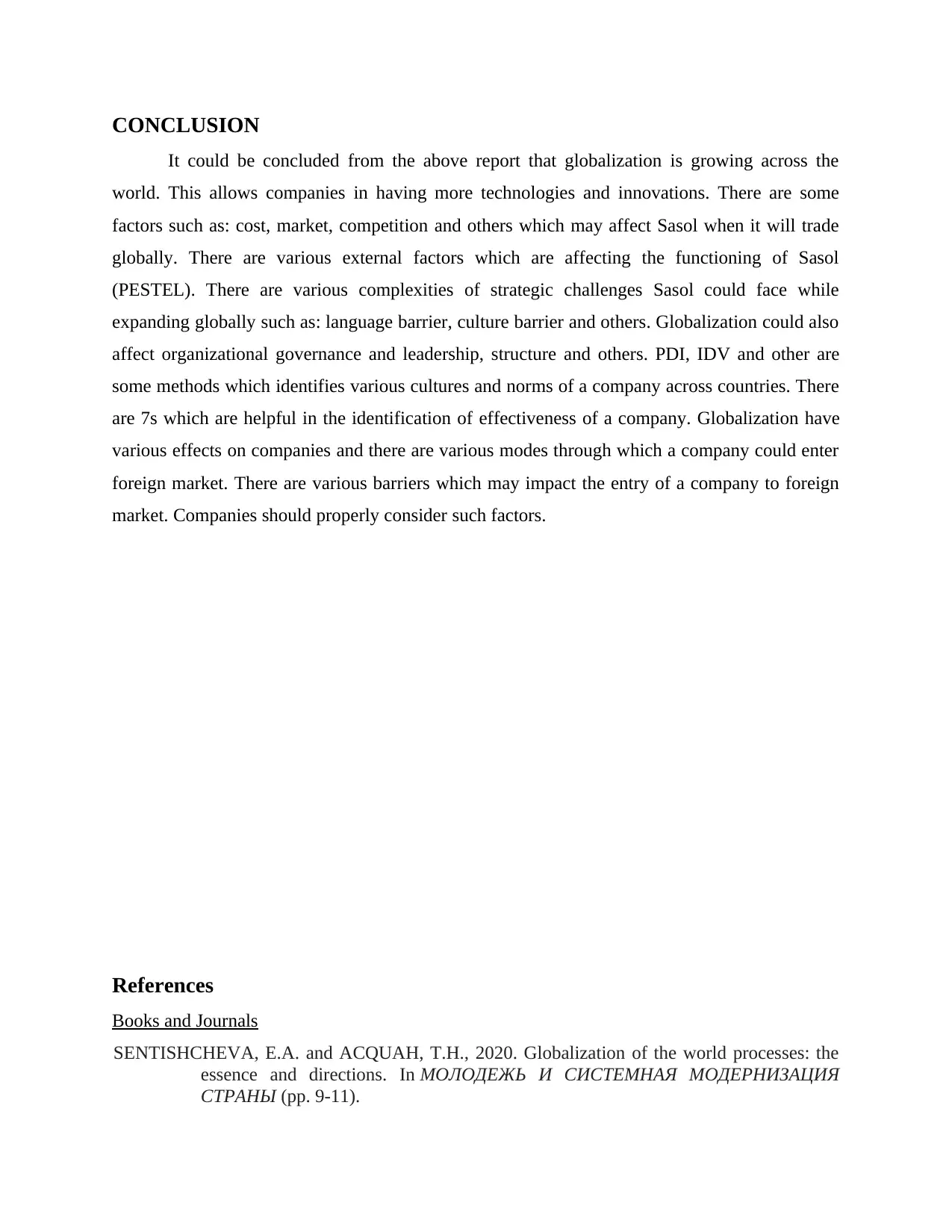
CONCLUSION
It could be concluded from the above report that globalization is growing across the
world. This allows companies in having more technologies and innovations. There are some
factors such as: cost, market, competition and others which may affect Sasol when it will trade
globally. There are various external factors which are affecting the functioning of Sasol
(PESTEL). There are various complexities of strategic challenges Sasol could face while
expanding globally such as: language barrier, culture barrier and others. Globalization could also
affect organizational governance and leadership, structure and others. PDI, IDV and other are
some methods which identifies various cultures and norms of a company across countries. There
are 7s which are helpful in the identification of effectiveness of a company. Globalization have
various effects on companies and there are various modes through which a company could enter
foreign market. There are various barriers which may impact the entry of a company to foreign
market. Companies should properly consider such factors.
References
Books and Journals
SENTISHCHEVA, E.A. and ACQUAH, T.H., 2020. Globalization of the world processes: the
essence and directions. In МОЛОДЕЖЬ И СИСТЕМНАЯ МОДЕРНИЗАЦИЯ
СТРАНЫ (pp. 9-11).
It could be concluded from the above report that globalization is growing across the
world. This allows companies in having more technologies and innovations. There are some
factors such as: cost, market, competition and others which may affect Sasol when it will trade
globally. There are various external factors which are affecting the functioning of Sasol
(PESTEL). There are various complexities of strategic challenges Sasol could face while
expanding globally such as: language barrier, culture barrier and others. Globalization could also
affect organizational governance and leadership, structure and others. PDI, IDV and other are
some methods which identifies various cultures and norms of a company across countries. There
are 7s which are helpful in the identification of effectiveness of a company. Globalization have
various effects on companies and there are various modes through which a company could enter
foreign market. There are various barriers which may impact the entry of a company to foreign
market. Companies should properly consider such factors.
References
Books and Journals
SENTISHCHEVA, E.A. and ACQUAH, T.H., 2020. Globalization of the world processes: the
essence and directions. In МОЛОДЕЖЬ И СИСТЕМНАЯ МОДЕРНИЗАЦИЯ
СТРАНЫ (pp. 9-11).
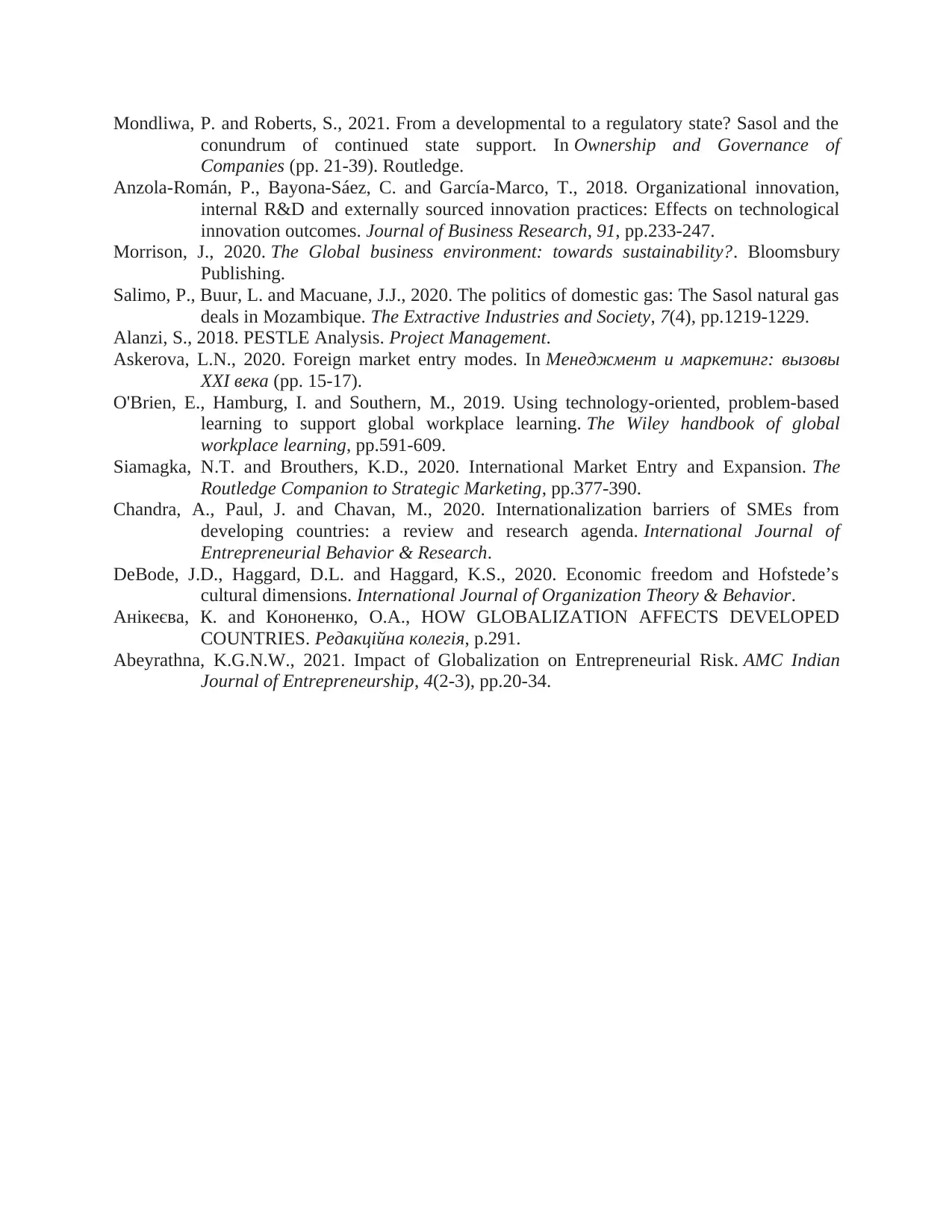
Mondliwa, P. and Roberts, S., 2021. From a developmental to a regulatory state? Sasol and the
conundrum of continued state support. In Ownership and Governance of
Companies (pp. 21-39). Routledge.
Anzola-Román, P., Bayona-Sáez, C. and García-Marco, T., 2018. Organizational innovation,
internal R&D and externally sourced innovation practices: Effects on technological
innovation outcomes. Journal of Business Research, 91, pp.233-247.
Morrison, J., 2020. The Global business environment: towards sustainability?. Bloomsbury
Publishing.
Salimo, P., Buur, L. and Macuane, J.J., 2020. The politics of domestic gas: The Sasol natural gas
deals in Mozambique. The Extractive Industries and Society, 7(4), pp.1219-1229.
Alanzi, S., 2018. PESTLE Analysis. Project Management.
Askerova, L.N., 2020. Foreign market entry modes. In Менеджмент и маркетинг: вызовы
XXI века (pp. 15-17).
O'Brien, E., Hamburg, I. and Southern, M., 2019. Using technology‐oriented, problem‐based
learning to support global workplace learning. The Wiley handbook of global
workplace learning, pp.591-609.
Siamagka, N.T. and Brouthers, K.D., 2020. International Market Entry and Expansion. The
Routledge Companion to Strategic Marketing, pp.377-390.
Chandra, A., Paul, J. and Chavan, M., 2020. Internationalization barriers of SMEs from
developing countries: a review and research agenda. International Journal of
Entrepreneurial Behavior & Research.
DeBode, J.D., Haggard, D.L. and Haggard, K.S., 2020. Economic freedom and Hofstede’s
cultural dimensions. International Journal of Organization Theory & Behavior.
Анікеєва, К. and Кононенко, О.А., HOW GLOBALIZATION AFFECTS DEVELOPED
COUNTRIES. Редакційна колегія, p.291.
Abeyrathna, K.G.N.W., 2021. Impact of Globalization on Entrepreneurial Risk. AMC Indian
Journal of Entrepreneurship, 4(2-3), pp.20-34.
conundrum of continued state support. In Ownership and Governance of
Companies (pp. 21-39). Routledge.
Anzola-Román, P., Bayona-Sáez, C. and García-Marco, T., 2018. Organizational innovation,
internal R&D and externally sourced innovation practices: Effects on technological
innovation outcomes. Journal of Business Research, 91, pp.233-247.
Morrison, J., 2020. The Global business environment: towards sustainability?. Bloomsbury
Publishing.
Salimo, P., Buur, L. and Macuane, J.J., 2020. The politics of domestic gas: The Sasol natural gas
deals in Mozambique. The Extractive Industries and Society, 7(4), pp.1219-1229.
Alanzi, S., 2018. PESTLE Analysis. Project Management.
Askerova, L.N., 2020. Foreign market entry modes. In Менеджмент и маркетинг: вызовы
XXI века (pp. 15-17).
O'Brien, E., Hamburg, I. and Southern, M., 2019. Using technology‐oriented, problem‐based
learning to support global workplace learning. The Wiley handbook of global
workplace learning, pp.591-609.
Siamagka, N.T. and Brouthers, K.D., 2020. International Market Entry and Expansion. The
Routledge Companion to Strategic Marketing, pp.377-390.
Chandra, A., Paul, J. and Chavan, M., 2020. Internationalization barriers of SMEs from
developing countries: a review and research agenda. International Journal of
Entrepreneurial Behavior & Research.
DeBode, J.D., Haggard, D.L. and Haggard, K.S., 2020. Economic freedom and Hofstede’s
cultural dimensions. International Journal of Organization Theory & Behavior.
Анікеєва, К. and Кононенко, О.А., HOW GLOBALIZATION AFFECTS DEVELOPED
COUNTRIES. Редакційна колегія, p.291.
Abeyrathna, K.G.N.W., 2021. Impact of Globalization on Entrepreneurial Risk. AMC Indian
Journal of Entrepreneurship, 4(2-3), pp.20-34.
⊘ This is a preview!⊘
Do you want full access?
Subscribe today to unlock all pages.

Trusted by 1+ million students worldwide
1 out of 12
Related Documents
Your All-in-One AI-Powered Toolkit for Academic Success.
+13062052269
info@desklib.com
Available 24*7 on WhatsApp / Email
![[object Object]](/_next/static/media/star-bottom.7253800d.svg)
Unlock your academic potential
Copyright © 2020–2026 A2Z Services. All Rights Reserved. Developed and managed by ZUCOL.
